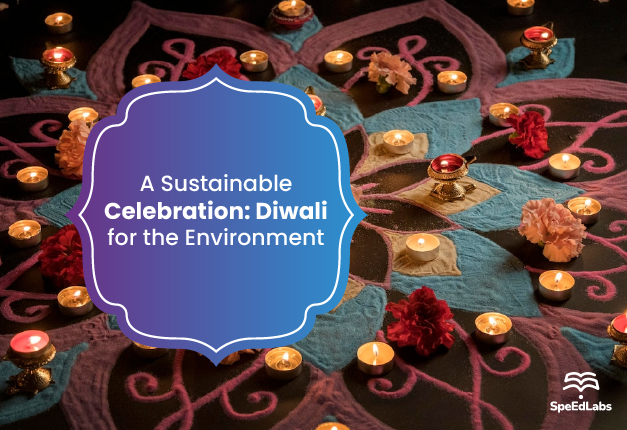Diwali is a festival of lights that began in India and is now observed in many nations where there is a sizable Indian population. Deepavali, which translates to “row of lamps” and denotes “victory of light over darkness,” is another name for Diwali in Sanskrit. Diwali is a significant cultural festival that is primarily observed by lighting many lamps in homes, stores, temples, and other buildings. It has also to be noted that along with respecting our festivals we should also respect our environment.
Nature was even worshipped in ancient times, so how can we forget its importance today? While celebrating festivals, we often fail to realise that we are destroying our environment.
What Firecrackers are doing to the environment?
However, today, firecrackers are used to celebrate Diwali, which makes for obtrusive noise and dangerous smoke. It is impossible to imagine Diwali celebrations without firecrackers because they have become a vital component of the holiday. Smoke from Diwali fireworks contributes to severe air pollution, which is a growing concern in major Indian cities.
- Firecrackers are made with barium metal, cadmium, lithium, and strontium compounds, copper and sodium salts, and magnesium metal. When burned, these chemical compounds produce brilliant light in a range of hues. The toxic smoke is a price that must be paid, though.
- Benzene, carbon monoxide, nitrogen dioxide, sulphur dioxide, and ozone are among the poisonous gases that make up the majority of the smoke’s constituent particulates. Additionally, these gases produce a SMOG that is more harmful to human health.
- The burning of fireworks during the Diwali festival in Jamshedpur, India, is said to have negatively affected the ambient air quality, as evidenced by the emission and accumulation of PM10, SO2, NO2, O3, and trace metals, according to Balram Ambade’s research paper with the working title “The air pollution during Diwali festival by the burning of fireworks.”
- According to the World Health Organization (WHO), 9 out of 10 people breathe air containing high levels of pollutants, around 7 million people die every year from exposure to polluted air and about 4.2 million deaths occur every year as a result of exposure to ambient (outdoor) air pollution.
To improve the situation of air pollution during Diwali, however, we can all contribute.
Stay away from firecrackers or use them sparingly
There are many reasons to skip the firecrackers this Diwali, even though for many of us they are inextricably linked to the holiday. The noise and toxic smoke produced by firecrackers are bad for your health. Animals, especially birds, can experience severe anxiety attacks when there is loud noise combined with bright light. You can restrict its use if you cannot prevent burning firecrackers. Simple measures like avoiding noise-producing firecrackers, participating in (and organising) community-based fireworks shows responsibly, instead decentralising firecracker burning, etc. can ease the burden.
Use earthen candles and diyas that are sustainable (lamps)
Earthen diyas can easily replace candles and electrically powered lamps. You may have seen small shops in your neighbourhood markets selling lovely diyas. These diyas are not only lovely, but they are also environmentally friendly, and economical, and give your homes and offices a traditional appearance.
One can choose to light earthen lamps instead of electrified lamps made of non-recyclable plastic which consumes a lot of power. These can be recycled, are inexpensive, and add a touch of natural beauty to the decorations. The option of turning on lights may appear appealing and simple. However, consider this: the traditional way of celebrating Diwali is the best way to protect both our health and the environment.
Eco-friendly presents
What could be better than giving them eco-friendly products for Diwali, a festival when gifts are also given to friends and family? It teaches people about environmental conservation in addition to saving the environment. You can give lovely terracotta diyas (lamps) in a range of sizes, shapes, and colours, bonsai trees, other plants, jute tote bags, organic tea, other consumables, khadi clothing, etc. Do not forget to include a personalised touch with eco-friendly, recyclable packaging for your gift.
Make Your Rangoli with Natural materials
Make your rangoli with natural materials like leaves and flowers like roses, marigolds, and chrysanthemums rather than those synthetic rangoli colours. For other colours, you can experiment with using turmeric, kumkum, and coffee powder. These items are not only sustainable but may also be readily disposed of in your compost bin the following day.
Also published on Medium.
